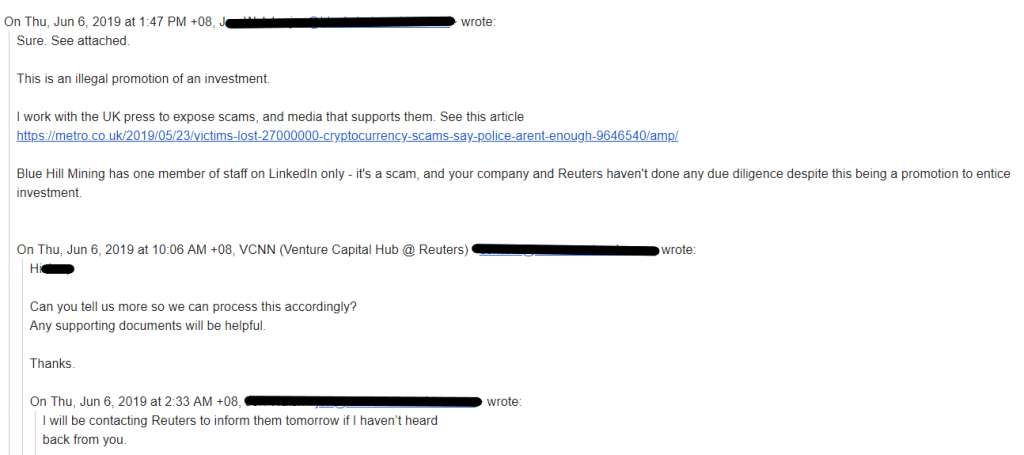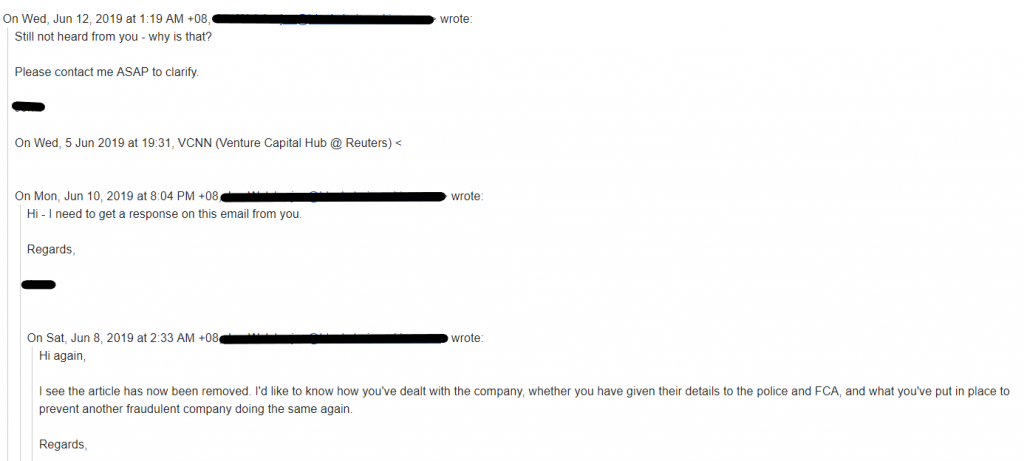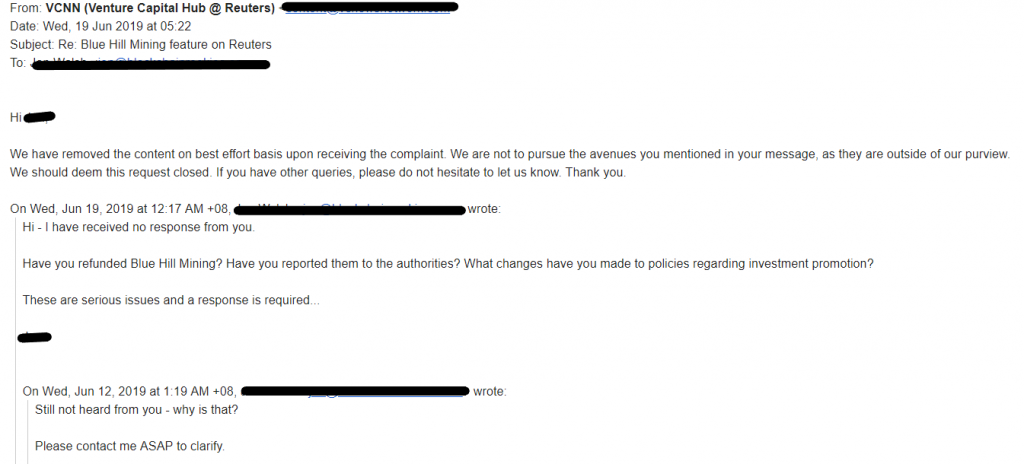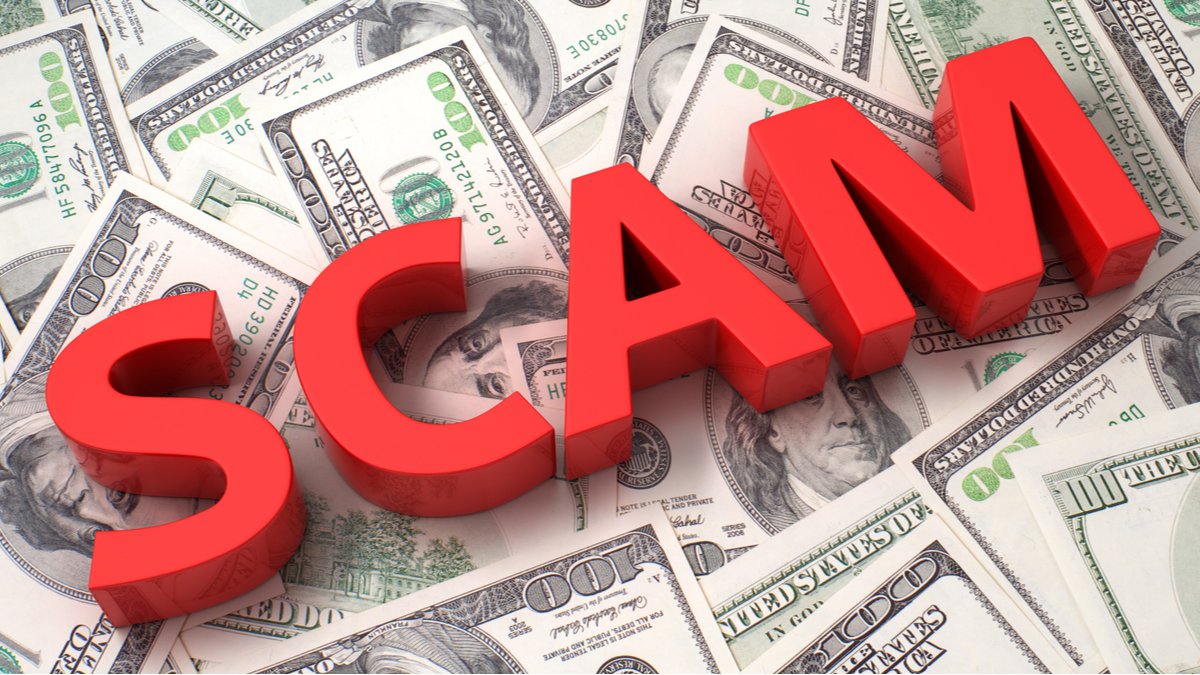Are we even surprised by journalistic ineptitude anymore? Or corporate greed? Or about a complete lack of concern for basic due diligence?
Recently, Jon Walsh, who is a dedicated scam hunter (and thus someone we admire quite a bit) was disturbed to see a piece running on Reuters illegally promoting investments in Blue Hill Mining, an STO. The problem here was two-fold, in that it violated the regulations around promoting securities, and it’s also rather likely that Blue Hill Mining is itself a scam.
Jon contacted Venture Capital Hub @ Reuters, who was responsible for posting the promoted content:

While we don’t expect a lot of editorial rigor when it comes to publishing sponsored content, a little due diligence is in order. We’d like to hope that Venture Capital Hub @ Reuters wouldn’t publish an article on how to rob a bank or murder your spouse, so why would they publish an article illegally promoting investments in a scam STO?
Here was the response:

Jon established his bona fides and his reasons for being suspicious of Blue Hill. So how did Venture Capital Hub @ Reuters respond?
While the article was taken down within a couple days of Jon’s message, VCH@R was slow to respond to inquiries about what follow-up actions they had taken:

Repeated inquiries went unanswered, until…

“Outside our purview.”
The only action they were willing to take was the “cover your ass” move of deleting the potentially illegal article. No apparent willingness to change their policies about promoting investments, and definitely no willingness to report them to the authorities.
I think we’ve all come to accept by now that “advertorials” and paid articles are just a part of the journalistic landscape now. While a few special publications like the Netherlands’ De Correspondent can get by with dedicated subscribers, most have to rely on advertising to stay afloat in the face of decreased subscriptions and increased competition from aggregators.
But the thing is, a simple disclaimer about paid content does not remove all responsibility from the publication. There has to be a review process in place to ensure that the sponsored piece doesn’t violate any laws or contain offensive material.
We’re not asking outfits like Venture Capital Hub @ Reuters to fact-check every figure or quote in the paid pieces they publish. We’re just asking them to do enough due diligence to make sure they’re not violating securities regulations or promoting an obvious investment scam.
Is that really too much to ask?
Recently, Jon Walsh, who is a dedicated scam hunter (and thus someone we admire quite a bit) was disturbed to see a piece running on Reuters illegally promoting investments in Blue Hill Mining, an STO. The problem here was two-fold, in that it violated the regulations around promoting securities, and it’s also rather likely that Blue Hill Mining is itself a scam.
A chance to make things right
Jon contacted Venture Capital Hub @ Reuters, who was responsible for posting the promoted content:

While we don’t expect a lot of editorial rigor when it comes to publishing sponsored content, a little due diligence is in order. We’d like to hope that Venture Capital Hub @ Reuters wouldn’t publish an article on how to rob a bank or murder your spouse, so why would they publish an article illegally promoting investments in a scam STO?
Here was the response:

Jon established his bona fides and his reasons for being suspicious of Blue Hill. So how did Venture Capital Hub @ Reuters respond?
Crickets
While the article was taken down within a couple days of Jon’s message, VCH@R was slow to respond to inquiries about what follow-up actions they had taken:

Repeated inquiries went unanswered, until…

“Outside our purview.”
The only action they were willing to take was the “cover your ass” move of deleting the potentially illegal article. No apparent willingness to change their policies about promoting investments, and definitely no willingness to report them to the authorities.
This has got to stop
I think we’ve all come to accept by now that “advertorials” and paid articles are just a part of the journalistic landscape now. While a few special publications like the Netherlands’ De Correspondent can get by with dedicated subscribers, most have to rely on advertising to stay afloat in the face of decreased subscriptions and increased competition from aggregators.
But the thing is, a simple disclaimer about paid content does not remove all responsibility from the publication. There has to be a review process in place to ensure that the sponsored piece doesn’t violate any laws or contain offensive material.
We’re not asking outfits like Venture Capital Hub @ Reuters to fact-check every figure or quote in the paid pieces they publish. We’re just asking them to do enough due diligence to make sure they’re not violating securities regulations or promoting an obvious investment scam.
Is that really too much to ask?

